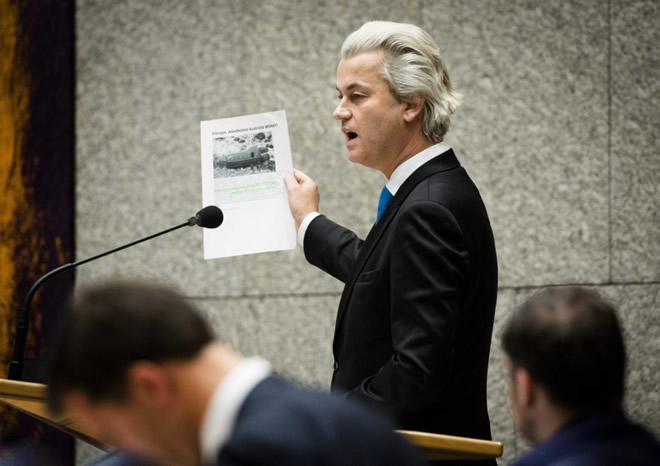

Thursday, April 30, 2015
Their letter is here, and it calls for excluding Wilders based on his harsh criticism of Islam and of Muslim immigration:
We write to raise our deep concern regarding the visit of Mr. Geert Wilders, a Dutch lawmaker known for perpetuating Islamaphobia. Mr. Wilders is scheduled to have a series of meetings in Washington next week. We respectfully request that the U.S. government deny Mr. Wilders entry due to his participation in inciting anti-Muslim aggression and violence.
In the past, the United States has denied entry to international leaders under the authority of the International Religious Freedom Act which allows the Department of State to deny entry to a foreign leader who is responsible for severe violations of religious freedom. This precedent is applicable to Mr. Wilders.
In 2010 and 2011 Wilders was formally charged with inciting hatred and discrimination by the Dutch government. Mr. Wilders is currently facing charges of inciting hatred for proposing to arrange the removal of Moroccans from the Netherlands at a campaign rally. Reports indicate that Anders Breivik, the Norwegian terrorist responsible for the murder of 77 people in Oslo, was inspired by Mr. Wilders’ hateful message.
Mr. Wilders’ policy agenda is centered on the principle that Christian culture is superior to other cultures. He justifies his desire to ban the Quran and Islam from the Netherlands with depraved comments like, “Islam is not a religion, it’s an ideology, the ideology of a retarded culture.” We should not be importing hate speech.
In the U.S., freedom of speech is a bedrock principle that distinguishes free societies from ones living under oppressive regimes. Freedom of speech, however, is not absolute. It is limited by the legal and moral understanding that speech that causes the incitement of violence or prejudicial action against protected groups is wrong. As Mr. Wilders continues his pursuit of political power, granting him entry will embolden him to engage in further incitement of violence and discrimination against Muslims.
Anti-Semitism and Islamophobia are sweeping through Europe. Mr. Wilders is among the hateful leaders responsible for perpetuating prejudice. Allowing him to enter the United States will cause harm to our nation that values religious freedom and respects pluralism.
Now the Supreme Court has held, in Kleindienst v. Mandel (1972), that the government has broad power to exclude would-be visitors, including based on speech that would be protected against criminal punishment or civil liability by the First Amendment. (In that case, the speech was advocacy of “revolutionary Marxis[m].”) Nonetheless, that such an exclusion is constitutional doesn’t mean that it’s wise, or consistent with broader free speech principles. It seems to me that Americans should be able to hear the speech of foreign visitors (assuming they are otherwise eligible to enter in the U.S., and unlikely to commit actual crimes in the U.S.), and responding to that speech if we think it wrong, and not just of people who are already here.
But beyond that, the representatives aren’t limiting themselves to relying on Kleindienst, either by name or by its logic; instead, they seem to be making a broader point about freedom of speech “[i]n the U.S.”:
In the U.S., freedom of speech is a bedrock principle that distinguishes free societies from ones living under oppressive regimes. Freedom of speech, however, is not absolute. It is limited by the legal and moral understanding that speech that causes the incitement of violence or prejudicial action against protected groups is wrong.
This is logic that applies just as much to Americans speaking in America as it is to Dutch lawmakers who want to come to America. In Rep. Ellison’s and Rep. Carson’s views, “freedom of speech” “is limited by” an exception for “speech that causes the incitement of violence or prejudicial action against protected groups.” And of course they aren’t just limiting their claim to the very narrow Brandenburg v. Ohio “incitement” exception to free speech, which is limited to speech intended to and likely to produce imminent lawless conduct — conduct in the coming hours or maybe few days (see Hess v. Indiana). Wilders’ statements don’t urge any imminent conduct (or even any criminal conduct, as opposed to long-term changes in the law). Such statements’ are “incitement” in the Congressmen’s opinion only because the Congressmen apparently view constitutionally unprotected “incitement” (or, as they term it earlier, “hate speech”) much more broadly.
Whether “Christian culture is superior to other cultures,” which groups should be allowed to immigrate into a country, and even whether Islam should be viewed as an ideology rather than a religion (an unsound distinction, in my view) are matters that the First Amendment allows us all to debate. The Congressmen quite clearly don’t want to allow Rep. Wilders to debate such matters here in the U.S. But their “In the U.S.” paragraph suggests that they view even such debates by Americans as constitutionally unprotected.